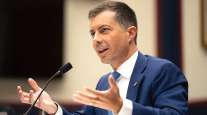Senior Reporter
Trump, Congressional Democrats Agree on $2 Trillion Infrastructure Package

After a private meeting at the White House on April 30, Speaker of the House Nancy Pelosi and Senate Minority Leader Chuck Schumer told reporters that Democrats had reached an agreement with President Donald Trump on a $2 trillion infrastructure measure.

President Donald Trump and Speaker Nancy Pelosi in March by Manuel Balce Ceneta/ Associated Press
“Building [the] infrastructure of America has never been a partisan issue and we hope to go forward in a very nonpartisan way for the future,” said Pelosi.
Although the plan still lacks a funding road map, Schumer explained the measure would address surface transportation corridors as well as explore ways for expanding access to broadband.
Schumer emphasized that negotiators agreed on the potential economic benefits that would come from modernizing freight corridors and transit systems, adding, “We hope [the legislation] will go to a constructive conclusion.”
The Democrats said they plan to meet with Trump in about three weeks to identify a funding approach for the $2 trillion measure. The meeting could potentially occur during the Infrastructure Week advocacy forum, set to kick off in Washington on May 13.
Despite the bipartisanship demonstrated at the White House meeting, congressional Democrats and Republicans have different views on infrastructure funding.
Key members of Pelosi’s caucus advocate for increasing federal fuel taxes, while senior Republicans in both chambers oppose a fuel tax increase and endorse funding alternatives, such as a fee for miles traveled.
.@SenSchumer following meeting with President Trump on #infrastructure: "This was a very, very good start. And we'll see, we hope it will go to a constructive conclusion."
Watch full video here: https://t.co/nE6Flfma5K pic.twitter.com/J373EbBSio — CSPAN (@cspan) April 30, 2019
The leader of the House panel on transportation, Chairman Peter DeFazio of Oregon, is a proponent of raising user fees and has expressed interest in considering an infrastructure package over the next few weeks.
“I made clear to the president that taking action to address our infrastructure needs is not optional — letting our roads, bridges, airports, transit systems, ports and water systems crumble amounts to a national crisis,” DeFazio said May 1. “We have let our infrastructure — and our infrastructure funding streams — stagnate to the point where we now need to invest hundreds of billions of dollars to make up for past neglect and plan for the future. There is no way around this reality if we expect improvement.”
DeFazio’s Democratic counterpart in the Senate, Environment and Public Works Committee ranking member Tom Carper, also a proponent of higher fuel taxes, indicated: “It’s time we stop throwing good money after bad, and start investing in roads, highways, bridges and transit systems that will harness innovation and withstand the impacts of our changing climate.”
Addressing reporters on Capitol Hill, Senate Majority Leader Mitch McConnell, a Kentucky Republican, did not comment on the agreement, noting his caucus was not at the meeting.
McConnell’s Republican colleague, Wyoming Sen. John Barrasso, chairman of the surface transportation panel, turned the focus on streamlining the permitting process and rural infrastructure.
“It’s important to remember that one size doesn’t fit all,” Barrasso told reporters. “We need to work on urban projects and rural projects and do it in a way that is fiscally responsible.”
Organizations representing freight firms, construction companies, transit users and labor unions continue to pressure lawmakers to advance infrastructure policy this year.
Pelosi to reporters after WH/Dems agree on $2T infrastructure package: “Building infrastructure of America has never been partisan and we hope to go forward in a very non-partisan way for the future." **(They intend to meet in about three weeks to discuss funding)** — Eugene Mulero (@eugenemulero) April 30, 2019
Speaking on Fox News shortly after the $2 trillion agreement was announced, American Trucking Associations President Chris Spear said, “The president is a builder. He campaigned on this. Speaker Pelosi, she wants to put wins on the board. I can think of no better issue to do it on than infrastructure.”
Jim Tymon, American Association of State Highway and Transportation Officials executive director, emphasized road users.
“The people and businesses who rely on our nation’s multimodal transportation network understand that despite the best efforts of state departments of transportation and their local and regional counterparts, they cannot keep up with growing demand and a deepening backlog of maintenance,” Tymon said.
AASHTO Statement On Bipartisan Support For Infrastructure Investmenthttps://t.co/KKWKgNW26C pic.twitter.com/tBm6iiQIRV — AASHTO (@aashtospeaks) May 1, 2019
“Infrastructure investment creates good jobs and career paths that can support a family, a child’s education, a secure retirement and a middle-class life,” added AFL-CIO president Richard Trumka.
Last year, the Republican-led Congress opted not to consider Trump’s 10-year, $1.5 trillion private sector-centric infrastructure plan.
Revenue from the Clinton-era 24.4 cents-per-gallon diesel tax and 18.4 cents-per-gallon gas tax will be insufficient to meet the obligations of a federal account in the coming years. This account, the Highway Trust Fund, assists states with transportation projects.




